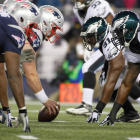There are so many predictions for a Super Bowl game, it's almost impossible to keep track of them all. The underdog will win by double digits. The favorite will take home the Lombardi Trophy just as it has done five times before. The MVP will not only not be a quarterback, it won't even be a player from the offense.
It's not even out of the question that a blocked extra point will be returned for two to tie the game late. And then there are predictions about the coin flip, the color of Bill Belichick's shirt, and the length of the national anthem.
But one prediction you never see? An asteroid interrupting the game.
To quote the fat-fingered fool who accidentally made everyone in Hawaii think a missile had been launched in their direction, "this is not a drill."
Check out SportsLine's look at the top 10 craziest prop bets for Super Bowl Sunday.
Asteroid 2002 AJ129, the actual name of said asteroid, is moving in the direction of our planet at the speed of 67,000 miles per hour and is set to pass our planet on Feb. 4, according to the Daily Mail, the same day Super Bowl LII will go down in Minneapolis.
I'm a "bad news first" kind of guy, so here's the suboptimal part of the program: if the asteroid managed to hit Earth, it would probably create a "mini Ice Age" that would result in darkness for about a decade. Fun times!
From the Daily Mail:
Scientists warned the 'very severe global impact' would last several years, causing the world to become a much darker, colder and drier place.
'These would not be pleasant times,' Charles Bardeen, of the National Center for Atmospheric Research said during a presentation at the American Geophysical Union (AGU) at the time.
In the 'worst case scenario', soot would remain in the atmosphere for around 10 years, while dust take six years to settle back on Earth.
But before you freak out, there is good news too.
The first piece of good news: the asteroid is supposed to pass us by; it is not expected to hit Earth. The second piece of good news: "potentially hazardous" qualifies as anything that is within 4,600,000 miles of Earth. NASA's "Asteroid Watch" Twitter account recently told everyone to simmer down.
In response to several questions, asteroid 2002 AJ129 will safely pass Earth on Feb. 4. At closest approach, it will be at a distance of 2.6 million miles / 4.2 million km -- over 10 times the distance between Earth and the Moon. More: https://t.co/ZhYzOXRSfP pic.twitter.com/baJhxv2Dzj
— Asteroid Watch (@AsteroidWatch) January 19, 2018
If you are unsure how math and geography and space work, 2.6 million miles is a lot of miles. The moon, by contrast, is less than 300,000 miles from the Earth. The moon is our buffer, our fall guy.
Not really -- the asteroid just isn't going to come that close, and even if it does, there are a wide range of sizes it could be. It's been described as bigger than any skyscraper man has ever built, but the Washington Post writes it could be as "small" as five football fields across.
Additionally, the Post points us to a quote from NASA manager Paul Chodas said there is a "zero" percent chance of the asteroid hitting Earth.
"We have been tracking this asteroid for over 14 years and know its orbit very accurately," Chodas said. "Asteroid 2002 AJ129 has no chance -- zero -- of colliding with Earth on Feb. 4 or any time over the next 100 years."
In other words, sleep very easy, Eagles fans. All you have to do is figure out a way to beat the Patriots. And also please don't burn the Earth down, because it should still be standing whether you win or lose the Super Bowl.






















